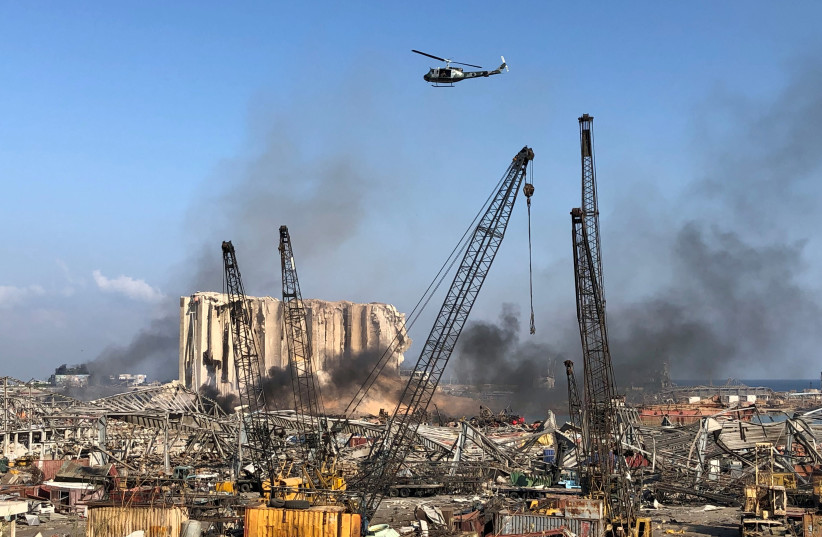As Lebanese lawmakers express outrage after an explosion occurred at a warehouse at the Beirut port that stored over 2,750 tons of ammonium nitrate for six years, Israelis raised concerns about similar risks at the Haifa port.
“We need to remove the dangerous chemicals from the Haifa bay,” said Likud MK Gila Gamliel to 103FM. “The plan is to remove the [chemicals] within five years and then another five years to clean the area.”
Eli Levi, a writer for Channel 13, told 103FM that “Anyone who sees the disaster in Beirut should understand that it can happen here too, in Haifa Bay – we have huge fuel tanks, a bromine and ammonia reservoir, albeit not in a tank, but in dozens of trucks in the bay.”
The chairman of the Knesset Internal Affairs and Environment Committee Miki Haimovich stressed that Israel should be “very troubled” by the explosion in Beirut and called to promote a plan to close the petrochemical industry in Haifa “in the heart of a bay and a population.”
Haimovich intends to call a meeting with all relevant authorities to examine the state’s readiness for a disaster such as the one in Beirut, including prevention, risk management and disaster preparedness.
The Haifa Environmental Research Center stated on Wednesday that there are “1,500 aggregate risk areas and 800 types of dangerous chemicals in the Haifa Bay in factories right next to our bedrooms.”
The Shafir report for examining risks in Haifa found that “factories and hazardous materials facilities in Haifa will be damaged in an emergency – as a factual determination.”
“The incident in Lebanon illustrates the danger of a concentration of hazardous materials near a dense population and pushes the urgent need to close flammable and explosive industries,” said the research center.
A large storage tank held about 12,000 tons of ammonia in the Haifa port was emptied in 2017 after the tank was found to be a dangerous risk by the Environmental Protection Ministry’s Shafir Committee. Temporary supplies of ammonia are allowed into the country via small ships and sent directly to consumers via a pipeline. The government is working to find a permanent solution for ammonia consumers.
Hezbollah Secretary-General Hassan Nasrallah threatened to hit the ammonia tank in 2016, prompting Israeli officials to work to empty and close the tank.
“This would be exactly like a nuclear bomb, and we can say that Lebanon today has a nuclear bomb, seeing as any rocket that might hit these tanks is capable of creating a nuclear bomb effect,” said Nasrallah, at the time.
Despite the ammonia tank in Haifa being emptied, the research center stressed that tankers carrying ammonia are located near residential areas. A fertilizer plant that prepares fertilizer and explosives is located in the center of Haifa and houses a container with 15 tons of unprotected ammonia.
The research center called on the government to raise the plan to close dangerous factories for an urgent vote.
Over a hundred people were killed and thousands were wounded in an explosion that damaged buildings and vehicles throughout Beirut on Tuesday.
The exact cause of the explosion remained uncertain as of Tuesday night, but Lebanon’s Supreme Council of Defense stated that over 2,700 tons of ammonium nitrate were stored for six years at the warehouse where the explosion occurred, calling this “unacceptable.”
After the explosion, Israel offered to provide humanitarian aid to Lebanon.
Following the explosion, Defense Minister Benny Gantz and Foreign Minister Gabi Ashkenazi conveyed via diplomatic and security channels Israel’s offer to provide humanitarian relief and medical support to the Lebanese people. Israeli defense officials denied that Israel was connected to the explosion, which came as the IDF was on high alert along the northern border in anticipation of a Hezbollah attack.
“We just want to lend a helping hand,” said the director of the Galilee Medical Center Dr. Masad Barhoum in an Arabic address to Lebanon’s prime minister on Army Radio. “Those who come to us will receive treatment and leave, G-d willing, healthy and whole.”
“Officials contacted us, through the army,” added Barhoum. “We are ready to establish a field hospital today. All the teams are ready for action and staff absorption.”
Ariel Ben Solomon and Yaakov Lapin contributed to this report.
